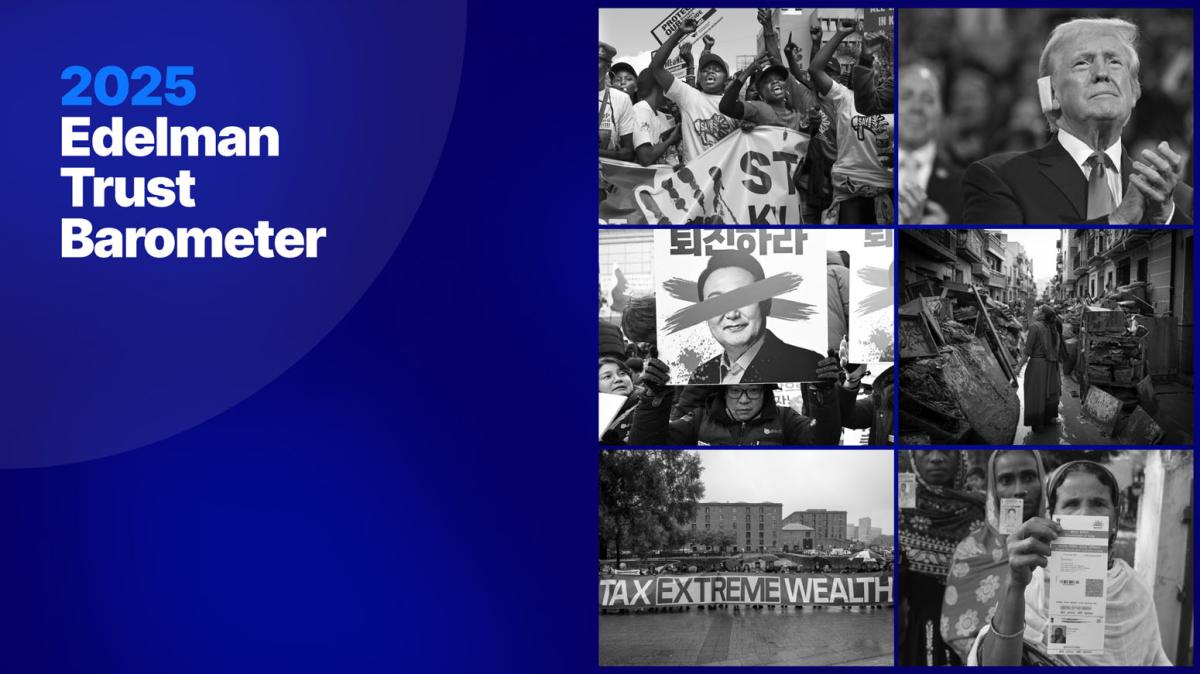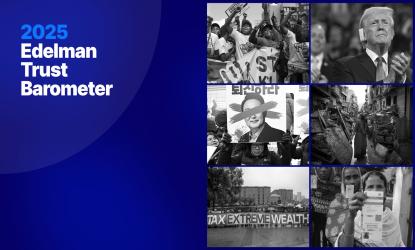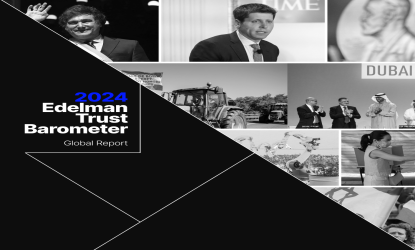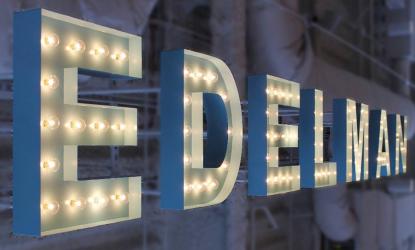What is trust? It boils down to belief. The belief that your expectations will be met. The belief that you will be looked after by institutions acting on your behalf. The belief that you will be treated fairly. The belief that your voice will be heard. The belief that your trust will be reciprocated. Belief is, in turn, built through actions and lived experience. Trust is the glue that holds society together. The greater the instability, the larger its role. Yet, in the midst of increasing political and economic turmoil, the 25th Edelman Trust Barometer reveals a worrisome state of institutional trust in Ireland: the Trust Index (the average percent trust in business, government, media, NGOs) has remained steadily in “distrust” for the past three years.
Where does this distrust originate? It stems partly from perceived incompetence, in particular the government’s perceived failure to deliver effectively on pivotal issues such as health, housing, affordability, and climate change. However, Edelman’s data signals a significant erosion in perceived integrity. Since 2021, there has been a surge in the percentage of Irish respondents who worry they’re being lied to, with roughly six in 10 respondents worrying that government leaders (57%), business leaders (61%), and journalists (60%) purposely mislead them. Deception breeds distrust.
Distrust in information is likely fueled by distrust in the media. The Edelman survey data reveals that only 30% of Irish respondents trust owned media and just 22% trust social media as sources of news and information. Crucially however, search engines and traditional media are not trusted either. However, this finding may mask high levels of trust in individual media sources, e.g., Reuters recently reported that RTE remains a trusted news source for 78% of Irish respondents. It may also be a manifestation of the mere exposure effect, i.e., the psychological tendency to positively evaluate and believe information to which we are frequently exposed, e.g., claims frequently circulated on social media that traditional media is ‘biased’. Whether real or not, the Edelman data suggests that perceived media impartiality is an issue for Irish respondents, with the majority expressing a belief that news organisations prioritise audience share and / or espousing a particular ideology over informing the public. This likely reflects an increasingly ‘blurry’ boundary between opinion and news items, with raw facts from trusted sources frequently being re-framed to give a particular ‘spin’. This tendency, combined with increased exposure to misinformation, has undermined our ability to distinguish fact from fiction. The Edelman Trust Barometer shows 65% of Irish respondents say it is becoming harder to tell if news is from respected media or an individual trying to deceive people.
Distrust is inextricably linked with pessimism – the expectation of negative outcomes. Just 22% of Irish respondents believe that things for the next generation in Ireland will be better than today. This pessimism reflects underlying anxiety about a future that has never looked so unsure. And there is nothing that humans hate more than uncertainty. As protectionist rhetoric from the new Trump administration grows ever louder, Irish employees are understandably fearful of their job security being impacted by globalisation and technology – specifically the impact of cheaper foreign competition (47% worried), international trade conflicts (51%), and AI / automation (45%). Economic conditions don’t just affect absolute levels of trust. They also generate trust inequality. The data reveals a 13-point gap in the Trust Index (average percent trust across business, government, media, and NGOs) between the top (56) and bottom (43) income quartiles, with the largest individual institutional trust gaps found for government (20 points) and business (16 points). Whereas wealthier respondents trust the government and business to do what is right, lower-income respondents distrust all institutions, with the government (40% trust) and media (39% trust) faring worst. The Edelman data also highlights the innate human preference for fairness, with 71% believing that the wealthy don’t pay their fair share of taxes and 60% believing the wealthy’s selfishness causes many of our problems.
Societal tensions are not just limited to the ‘haves’ v ‘have nots’: 51% of all Irish respondents worry about experiencing discrimination - an all-time high since 2021. Women and the over-55 year olds report the largest annual increases (up 12 and 14 percentage points, respectively). Women’s fears most likely stem from increasing ‘anti-woke’ sentiment in the US. These will not be assuaged by recent announcements from several high-profile Irish organisations that they will be reneging on prior public commitments to DEI targets and ‘sunsetting’ their DEI programmes, despite persistent gender gaps in pay, promotions and representation. This very public signal that DEI can be dispensed with for political expediency may lead women to (inaccurately) conclude that most organisations feel the same way, undoing years of effort to make women feel more valued at work. The comparatively asset-rich over-55s on the other hand may fear attracting backlash from younger generations who have been ‘locked out’ of the housing market.
Rising pessimism, anxiety, and social inequality create an ideal breeding ground for resentment. One in five Irish respondents (21%) have a high sense of grievance which is defined as the belief that business and government serve the select few and their actions hurt me, the system is biased in favour of the rich and powerful, and the rich are getting richer while regular people struggle. Grievance imposes a large trust penalty – both generally (high-grievance Irish individuals distrust all institutions) and within specific domains (just 9% of thehigh-grievance cohort in Ireland trust AI versus 34% of low-grievance respondents). Grievance also drives polarisation and partisanship through the construction of ‘them’ v ‘us’ oppositional identities, in which like-minded individuals unite against a common foe – often ‘the establishment’. This is inflamed by misinformation and online echo chambers which facilitate confirmation bias, the psychological tendency to disregard information which contradicts pre-existing beliefs. The result? Zero-sum thinking. High-grievance respondents in Ireland are over twice as likely to believe that actions which further the interests of people with different political beliefs to theirs must, by definition, hurt them.
For some, grievance may make people feel that their resources and / or way of life are under attack. This automatically triggers a ‘fight or flight’ threat response in their brains. They may elect to completely opt out from (pointless) civic engagement (flight). Alternatively, as we saw with Brexit, they may ‘fight’ by displacing their frustration onto ‘out groups’ (immigrants), to whom they misattribute the cause of their plight (unemployment), and / or by engaging in ‘hostile activism’. In Ireland, 57% of 18-34 year olds and 33% of 35-54 years olds surveyed approve of someone taking one or more hostile actions (including attacking people online, intentional disinformation spreading, damaging property, and threatening or committing violence) as a means of bringing about societal changes which would secure a better future for them and their family. The fact that one in three Irish respondents overall would endorse such traditionally counter-normative behaviours is concerning from a social order perspective. However, intentions are not the same as action. Furthermore, within a threat-response context, activism can be viewed as a ‘natural’ primal response to endemic societal inequality, the main aim of which is to attract attention and raise awareness.
Understanding the origins of distrust holds the key to tackling it. Trust requires openness and two-way vulnerability. Our leaders need to do better in terms of boosting perceptions of integrity by making knowledge gaps in policy-making explicit and owning their mistakes. They need to be more honest about their motives, e.g., is the switch back to mandatory office attendance really due to falling productivity or is it primarily driven by the need to justify prior investments in expensive office space? Humans react perversely to perceived manipulation and are more likely to accept unfavourable outcomes if the decision-process is perceived to be procedurally just. The 2024 OECD Survey on Drivers of Trust in Public Institutions highlights the crucial role played by evidence-based policy making and experts in this regard. Over three out of four of Edelman’s Irish respondents trust scientists and teachers to do what is right. This could be leveraged by fostering applied research partnerships with academic institutions and by a more inclusive approach to policy-making which harnesses latent expertise through the development of cross-institutional, multidisciplinary networks such as the Irish Behavioural Science and Policy Network (IBSPN).
Trust requires compassion. It requires an acknowledgement on the part of our leaders that humans are naturally risk averse. For example, trusting AI constitutes a leap of faith which could be facilitated by imparting a clear understanding of the personal benefits and reassurances around privacy and surveillance. Similarly, trusting strangers requires a commitment on the part of leaders to encouraging positive contact at community level by supporting initiatives aimed at eroding social divisions, building cohesion and forging shared social identities by co-operating to achieve superordinate goals (e.g., Tidy Towns; the GAA, etc.). At a national level, our leaders need to speak to the threads of shared humanity that unite us a nation and actively signal through bi-partisan co-operation that we are stronger together than apart when it comes to promoting the common good. At a grassroots level, compassion requires consultation. Rather than presenting the public with an effective fait accompli and seeking feedback after the fact, leaders must instead seek to engage local communities at the pre-design stage by demonstrating an openness to listen to, and ideally incorporate where at all possible, diverse views in relation to decisions directly impacting those communities, e.g., planning decisions and the location of asylum centres. The New European Bauhaus policy and funding initiative of the EU Commission, such as THRIVE, provide excellent examples of how national and local-level institutions can harness pre-existing, trust in Ireland for EU institutions and earn trust from the ground-up by supporting and empowering residents to transform their built environments into more sustainable, beautiful, and inclusive neighbourhoods. A win-win for all.
Finally, trust requires consistency. We need to be able to rely on our leaders to act in accordance with their stated principles and values. As the most trusted institution in Ireland, business plays a crucial role here. Whether organisations choose to ‘walk the walk’ and stick to their guns in relation to sustainability and DEI, as examples, will have important ramifications. Behavioural ‘flip-flopping’ is the enemy of trust. So too is the failure to consistently deliver public services in a reliable and fair manner. As the OECD Trust Survey highlights, one of the key factors bolstering current levels of trust amongst Irish respondents is their relative satisfaction with their day-to-day interactions with the Civil Service and public services, with the notable exception of healthcare. As the authors point out, further improvements could be garnered through increased harnessing of data and AI to identify potential holes and efficiencies, and by giving the public a greater voice in the co-design of public policy.
Underpinning all of this is the need to rebuild trust in the media. Whilst accountability is key, we cannot rely on regulation alone. Trust may be boosted by highlighting the professional integrity standards which distinguish traditional media from owned and social media (e.g. editorial autonomy; ownership restrictions and content liability). Other possibilities include empowering individuals to take personal responsibility through digital literacy programmes, ‘psychological inoculation’ (controlled exposure to misinformation) programmes and ‘pre-bunking’ interventions , and the use of timely ‘nudges’ (e.g., pop-ups that ask people to pause and reflect prior to mindlessly sharing content). Most importantly, however, the lack of a level playing field in the sector must be addressed. Whilst providing accurate, unbiased, (but often less ‘popular’) information in a profitable manner is the primary raison d’etre for much of the traditional media, social media exists purely to make money, with a resultant reliance on clickbait and attention-grabbing ‘negative’, emotional, and sensational content. Rebuilding trust will require addressing this misalignment of incentives by providing more state support to stem the decline in independent, compliant news outlets. It also demands a collective effort on the part of all institutions to increase transparency in the owned media sector.
Whilst trust may be waning, all is by no means lost. The tide can still be stemmed. Trust is highly contextual and mirrors the prevailing external environment. As Edelman’s data demonstrates, grievance, pessimism, and distrust go hand in hand. Trust can be re-built from the ground up by addressing inequalities, strengthening community ties, and promoting grassroots civic engagement. Trust is not pre-determined. It can be earned. The data suggests that one of the best ways for leaders to gain legitimacy is by demonstrating that they understand the needs and wants of ‘regular’ people like me. This will require a national conversation around the type of society we want to build and a corresponding reset of the behavioural expectations, social norms, and culture which reinforce the ‘sacred values’ that bind us. Future generations are relying on us. We must not abuse their trust.









